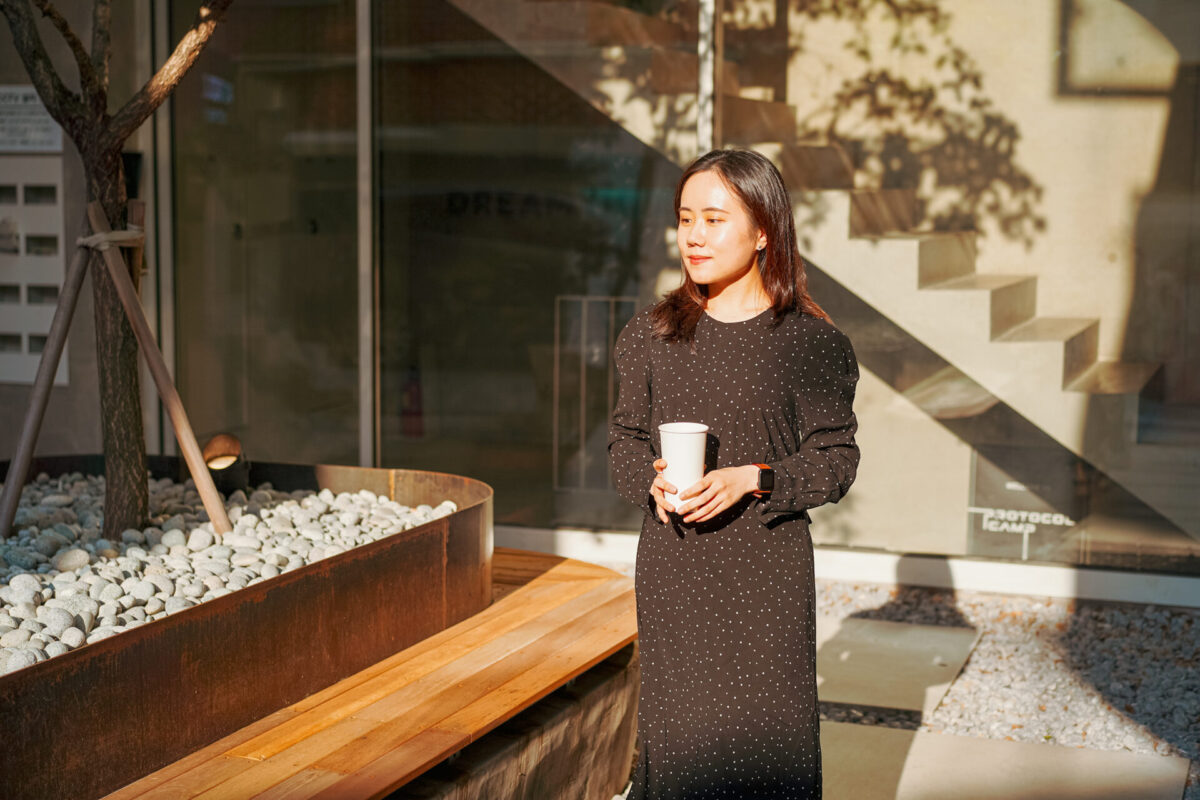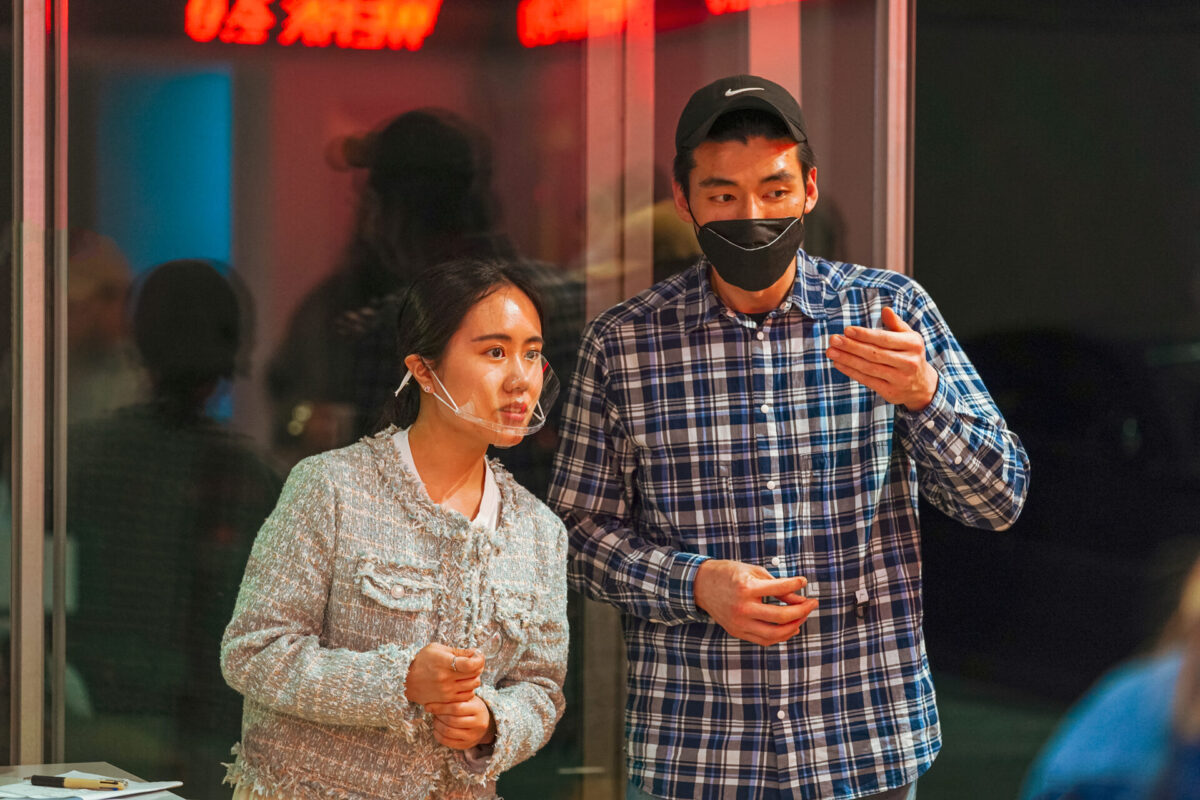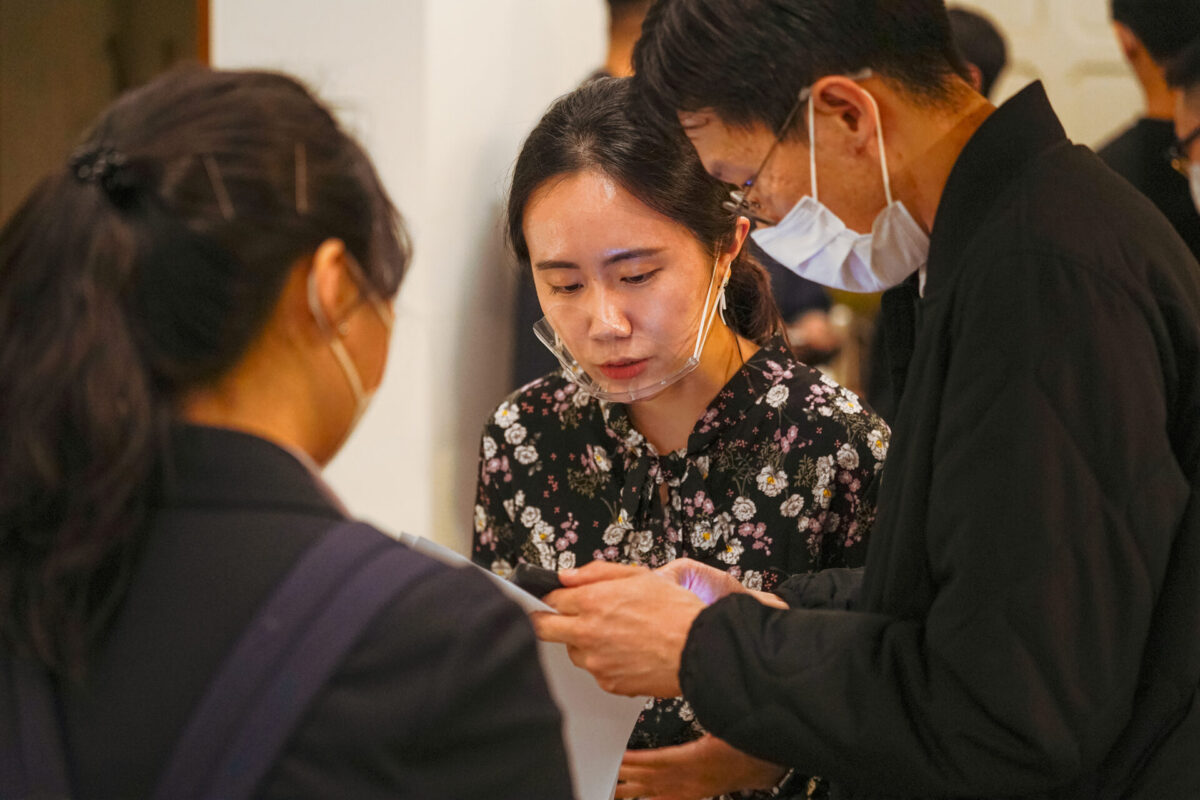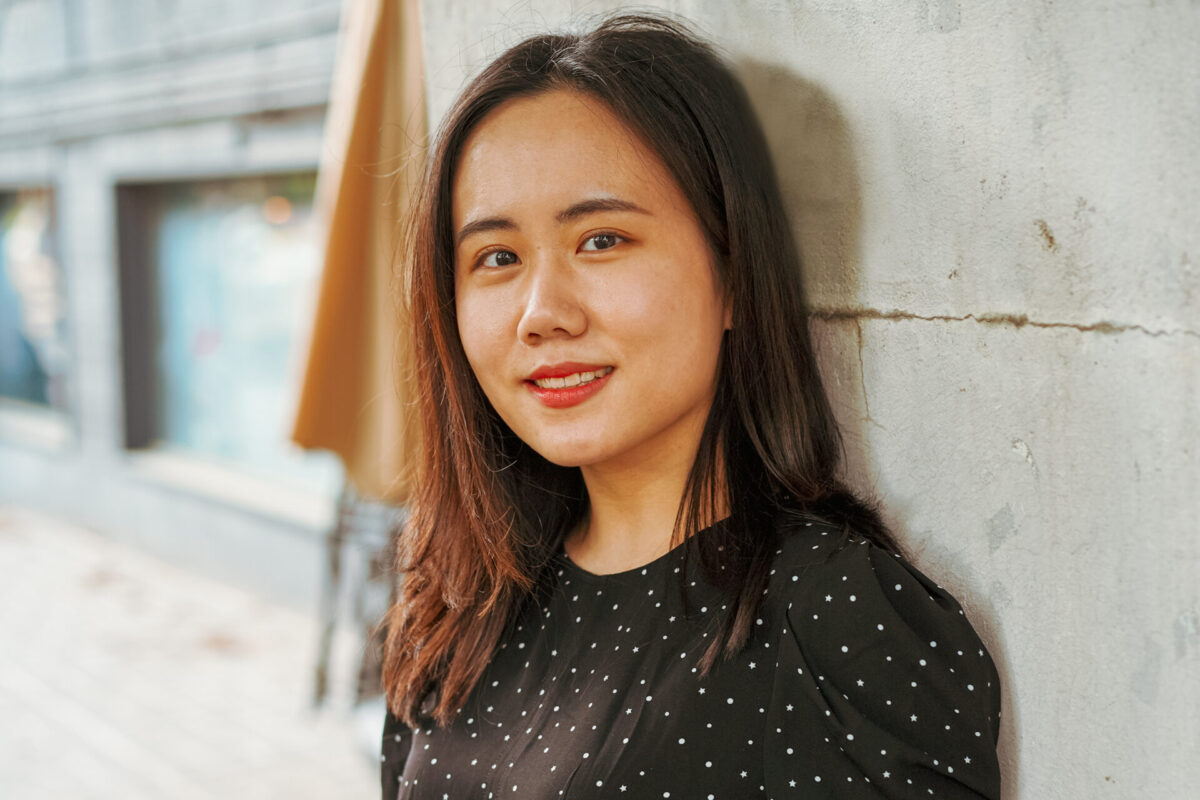
Building a future by living in the now
Since joining Typica in January 2022, Soi Sin has formed many great relationships in her role as Korea’s community manager. In April 2019, Soi came to Japan as part of a student exchange program and spent ten months splitting her time between university and her part-time job, all while learning the language. Once back in Korea, Soi began searching for jobs which would allow her to use her Japanese, but to no avail. Finally, just as she was about to give up, she found Typica. We asked Soi what it means to her to live in the now.

Atypical Typica
“If you can’t attend the interview in person, we can’t hire you.”
September 2021. The COVID-19 pandemic put the world at a standstill and Soi was stuck in Korea, unable to get to interviews in Japan.
Getting to the final stage in the interview process, only to be given an ultimatum that she could do nothing about, it was difficult not to feel defeated.
Soi began to think that maybe she had set herself an impossible task, and negativity was setting in. She began to wonder if the issue was not the pandemic, but her. At that point, Soi had made it to the final interview for several companies but had yet to receive an offer.
“I didn’t want to apply for positions that were for foreigners. I looked for jobs on Japanese recruitment sites because I wanted to work like everyone else, and be employed for my skills, not my nationality. After a while, I began to wonder if Japanese companies were reluctant to hire me because of the extra paperwork involved in processing my work visa. Maybe it was just easier for them to hire a Japanese graduate.”
By September 2020, Soi had been looking for a job for nearly a year. Without knowing the real cause, Soi’s confidence was waning. She decided to widen her search, willing to work for any company, and take on any role. Feeling desperate, Soi began looking at Japanese companies hiring for the Korean branch.
That was when she found Typica. When the person who interviewed Soi mentioned how they’d remembered seeing her at Typica’s recruitment orientation, it gave a her a glimmer of hope and much needed boost to her confidence.
“I remember seeing Typica’s website and attending the orientation and getting the feeling that they were not a normal company – but in a good way! It’s hard to put it in to words, but Typica was so unexpected. I could tell it was unique, and unlike any other company.”
Her final interview with Masashi Goto, founder of Typica, was another unique and unexpected experience.
“He didn’t seem interested in what I could bring to the company. He wanted to know what kind of a person I was. I don’t remember the exact conversation, but when he said, “Don’t tell me what you think you should say. Tell me what you really think,” it was a wakeup call.
I stopped giving the standard eager graduate spiel, and started being more genuine in my answers. But I still felt that I wasn’t what he was looking for. So when I got the offer, it was a complete shock. A happy shock, but totally unexpected.”

Keeping a promise to yourself
Born and raised in Korea, Soi’s interest in Japan began with two Japanese TV series: “Kodoku no Gurume (Solitary Gourmet)” and “Shinya Shokudo (Midnight Diner)”.
Both series depict the life of people living in the city with eating as a central theme. The theme was enough to draw foodie Soi in, and the simple and unpretentious storytelling style soon made her a diehard fan.
In her third year of university, wanting to dive even deeper into the world of her favorite TV shows, Soi began writing out the lines of the characters. Before she knew it, her hobby had helped her learn a new language.
Soi began to think about using Japanese in her future career, and in the spring of her final year at university, joined the student exchange program and headed to Japan.
Before leaving Korea, Soi made a promise to herself: She wouldn’t ask her parents for financial help, she’d pay her own way. It was her decision to go and for Soi, taking full responsibility for her actions was the right thing to do.
As soon as she arrived in Japan, she began to look for a job. She just needed something that could fund her year abroad and wasn’t choosy about the job type or role. Eventually she found a job with Loft, at their Shibuya branch in Tokyo.
When asked about that time in Japan, Soi says she remembers it as being intense. She was earning 100,000 yen a month while also trying to keep up with her school work. There was no time for rest or enjoying her time in Japan. When she had to hand in a report, she’d have to stay up all night to complete it. Going without sleep for two nights was standard, and sometimes she wouldn’t sleep for four days just to meet a deadline.
But nobody can keep that up for ever. Whenever she was at university, Soi was constantly battling to stay awake. As soon as she slumped down into her desk, she’d find herself drifting off and it wasn’t long before sleep took over. She’d use the ten minutes between classes to get a power nap, waking up in time to rush off to the next lesson.
“When I look back, I think what got me through it was knowing that this was the only way. I had no other choice but to do it. Physically, it was tough. But at the same time, I knew my Japanese was improving and that was enough to motivate me to keep pushing myself.”
While Soi was in Japan, her parents kept putting her allowance in her bank account, unaware of Soi’s determination to support herself on this venture. True to her promise, Soi left the money untouched and returned the amount in full to her parents when she returned to Korea.
“When I handed the money to my mom, she just stood there and cried without saying a word. Later, my parents told me how proud they were of me doing it all on my own, and it made all that hard work worthwhile.”

The importance of the human touch
At first, the job at Loft was nothing more than a paycheck for Soi. But the more she worked there, the more she learned about finding joy in work.
She worked at the duty-free counter serving foreign tourists. After only three months, people began to take notice of her. Quick to learn, Soi was soon a master at gift-wrapping, and was able to produce an exquisitely wrapped parcel faster than anyone on her team.
She was so good at what she did that customers would rather line up and wait to be served by Soi, than be attended on by other people working behind the counter. Customers would love to watch her work, and were always saying how amazing she was, so impressed were they by her swift and skillful technique.
“I wanted to do something in return, so I learned how to say “thank you” in as many languages as I could. It’s a small thing but it helped to bridge the gap. I began to understand the joy you can feel from helping someone, of providing a service that makes someone happy.”
During her ten months at Loft, Soi became an invaluable member of the team. When she told them she was leaving to go back to Korea, the shop floor manager said he had hoped she’d stay to become a regular employee. The part-timers who worked alongside her were no different: “What will we do without you, Soi??”.
”I just love to talk to people,” says Soi, who is happy to talk to anyone, no matter who they are or what they do. She’d strike up a conversation with people in the break room, even though they worked at a different department store. She’d as happily talk to the cleaner as the manager.
“The other part-timers we always taken aback when they saw me saying hi to all of these different people. But I wasn’t doing anything special. One day you’re saying hi to someone, and then gradually the relationship develops until before you know it, they’re asking how you’re doing, giving you snacks and you’ve formed a friendship. That was also something I enjoyed about working there.

Soi was exactly the same at university. The law department, which has about 120 students, had several annual events including mock trials and social mixers with the professors. As a rule, attendance was compulsory for all students and the people in charge of organizing needed to have excellent communication and project management skills to make sure the plans went off without a hitch.
In Korea, being respectful to your elders, even if they are only a year older, is an important part of the culture. So when it came to asking those students in the class who had delayed university entry and were therefore a year older than everyone else, it was an intimidating task that no one wanted to volunteer for. More often than not, it was left to Soi.
“I want to talk to as many people as I can, and even if we can’t talk, then a quick hi or good morning will do. I don’t understand people who’ll ignore you even if you’re looking right at them. I mean, I don’t go saying hi to every stranger I meet on the street. But you get the picture!” laughs Soi.
Since childhood, befriending people without judgement has always been a part of Soi’s nature.
Back in fourth grade, there was a girl in Soi’s class that was always alone. The girl (“Eiko”), would never say hi to anyone. Unable to ignore her, Soi went up to Eiko and said, “Why are you always on your own?” and began to chat with her. Gradually, Eiko began warming to Soi.
It wasn’t long before the class started to notice. At first, Soi’s friends couldn’t understand why she wanted to talk to Eiko. But soon they were joining in too. By fifth grade, Eiko was no longer shutting herself off from the class. She’d become one of them.
“I don’t think Eiko really wanted to be on her own. I think she was just waiting for someone to talk to her. When we graduated, she said “If you hadn’t come up and spoke to me that day, I don’t know what would have happened.” I’ll never forget that. And even though we went to different Junior High schools, 15 years on we’re still friends.”

One day, before you know it, everything has changed.
Majoring in hip-hop dance at an arts High School, Soi’s choice to study Law at university was unexpected.
“Everyone around me only cared about the arts. No one was interested in literature, science, or what was happening in society, I didn’t want to stay in this narrow little world. I wanted to discover new things. That’s when my teacher recommended a law degree.”
That desire to discover something new brought Soi to Japan, helped her learn the Japanese language and eventually brought her to Typica. Although happy to finally have found a job, it hasn’t all been plain sailing for Soi.
“The community managers for the Japan and Taiwan teams are the same age as me, but they’ve come to the job after already proving themselves in previous roles. As a new graduate, I have zero experience. And there’s a danger of focusing on what I lack rather than what I have. I can feel that my confidence might began to slip.
But, it’s different to what I felt trying to find a job back in 2021. Now I’m getting so much support from the other team members, and whenever I talk to Masashi, who seems to know everything, I always come away with a positive feeling about where I can make a difference, or what I can do to improve. In the beginning, I worried what I would do if I couldn’t achieve my KPI. But now, I focus on what I can do to achieve my goals, instead of the what ifs.
And when the roasters say how grateful they are for what I do, or tell me what a great job I’m doing even though I’m on my own, it gives me this huge boost of energy and motivates me to keep going. The other day I had a message from one of the roasters I work with: “The green beans have arrived, thanks for all your hard work. Next time you drop by, I look forward to making you a fresh cup of coffee!”. Things like that make it all worthwhile.”
Now in its third year and growing at an incredible pace, there are still a lot of challenges to face for Typica, and for Soi.
“I’m not an expert in coffee, and there is so much I still have to learn. So it’s hard to set a personal goal right now. But I do believe that as long as I keep trying hard, I’ll get there in the end.”
The key to Soi’s positivity is in her motto “One day, before you know it, it’ll come together”
“As long as you keep trying hard to tackle the challenges right in front of you, then one day, before you know it, you’ll get to where you want to go and gain something valuable in the process.
Looking back, I had no idea that watching a Japanese TV series would lead to an exchange study program, or that I would one day be working in job that needed Japanese.
Studying Japanese, coming to Japan for a year, trying to use all my time to communicate in Japanese, joining Typica, running the Korea branch on my own…none of this was planned. I just did what I needed and then one day, before I knew it, it all came together.
It’s the same about every aspect of my life, even client relationships. During the pandemic, conversations with roasters were mostly over the phone. Now, I’m so happy to meet these people in person. I never had the goal of building great relationships with my clients. I just like talking to people. It’s more like, before I knew it, our interactions and conversations had led to this great relationship. The relationships are getting stronger, and thanks to that I’m always discovering new things. And that’s what makes this job so interesting.”
Who needs well thought out strategy and goal setting when you have an open mind and a positive outlook on life? Not Soi. And one day, it’s going to be what makes her an invaluable asset to Typica.
